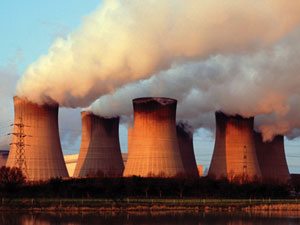
[miningmx.com] – AT a time when European governments retreat from
punitive carbon pricing regimes to stimulate their economies, South Africa intends on
introducing punitive measures for carbon emissions with its proposed carbon tax
policy.
National Treasury last week published the second policy paper, aimed at introducing
carbon taxes for implementation from 1 January 2015. In the policy paper, a tax of
R120 per tonne of carbon dioxide-equivalent is proposed, with a 60% tax-free
emissions threshold and some exemptions for heavy emitters.
But stakeholders in the manufacturing, mining and materials beneficiation industries
are perturbed about the potentially negative impact that such a tax could have on the
economy, fearing it could increase the cost of doing business in South Africa.
Mike Rossouw, chairman of the Energy Intensive Users Group (EIUG), told MiningMx
the organisation’s biggest concerns are that the tax-free allowances stipulated in the
policy document are much lower than international norms. “This means business
competitiveness in South Africa will suffer,’ he said.
“The level of tax must consider the total tax burden being carried by business and
industry, particularly in the light of the European Union’s carbon price collapse.’
In January this year, the EU proposed a so-called backloading plan, which would
involve delaying the sale of 900m carbon permits for five years to increase the price
of carbon permits. The plan however needed backing from Europe’s parliamentarians
and ministers to become law.
But last month, the EU parliament voted against the proposal. This resounding veto
shows European governments have moved to rather stimulate their economies and
oppose punitive carbon pricing, Rossouw said.
He emphasised that business and industry have not rejected the carbon tax policy.
“But the current proposal requires significant engagement (with treasury) to avoid the
negative impact on the economy.’
The Manufacturing Circle, made up of a number of South Africa’s leading medium to
large manufacturing companies from different industries, is also concerned about the
harmful effect the proposed tax policy could have on the competitiveness on South
African industries.
“Chinese manufacturers for example are more competitive precisely because they’re
not subjected to environmental taxes,’ Coenraad Bezuidenhout, executive director of
the Manufacturing Circle told MiningMx.
At a media briefing yesterday, treasury insisted the Carbon Tax Policy is not meant to
raise revenue, but to encourage business and consumers to change their behaviour
and invest in a greener economy.
Bezuidenhout doubts this tax will have the desired effect. “South African
manufacturers will probably choose to adapt to this new tax liability than innovate and
invest in greener economies.’
According to him, industries which are “heavy carbon emitters’ have a limited scope
to convert to greener economies before they hit the proverbial brick wall. “Yes, we
acknowledge that we need to comply with carbon emission reduction policies, but we
are indeed concerned that this is just another way of generating revenue for
treasury.’
Another gripe industry players have with the proposed tax is that it would also apply
to Eskom. In the policy document, it is stated that the electricity sector will qualify for
a tax-free threshold of up to 70% during the first phase. But stakeholders argue
Eskom should instead be relieved from this tax.
Says Rossouw: “The electricity sector should be exempted, since this tax will be
passed through completely to the consumer.’
The Democratic Alliance’s spokesperson on finance, Tim Harris, concurs. “The reality
is that the introduction of a carbon tax together with Eskom’s effective monopoly on
electricity generation will simply result in the costs of any such tax being passed onto
ordinary South Africans who are forced to buy energy from Eskom.’
Business Unity South Africa (Busa) also expressed concern about Treasury’s decision
not to do away with the existing electricity levy on electricity produced from non-
renewable sources, such as coal, and from nuclear energy. “This tax will however not
be abolished as part of the revenue generated from this levy funds some of the
demand-side measures currently being implemented by Eskom,’ treasury said last
week.
The decision to not abolish the electricity levy – which is essentially a tax on carbon –
is inconsistent with the commitment to do so made by the Minister of Finance in his
2013 Budget Speech, Busa said.
Promethium Carbon, a carbon advisory firm, pointed out there is also “a number of
good news items’ included in the Policy Paper, including the low effective tax rate.
Companies will pay tax of between 10% and 40% of their emissions, which sets the
effective tax rate at between R12 and R48 per ton of carbon. “This is significantly
lower than the R50 to R60 we are already paying in the non-renewable levy and the
contribution to government’s Renewable Energy Independent Power Producer
Procurement (REIPP) programme,’ the company said in a statement.
Treasury’s latest version of the Carbon Tax Policy updates the 2010 discussion paper
on how to reduce Greenhouse Gas Emissions and also take into account public
comments received. The current paper is the second and final round of comments on
carbon tax policy. Stakeholders and the general public will have until 2 August this
year to comment on the discussion document.










